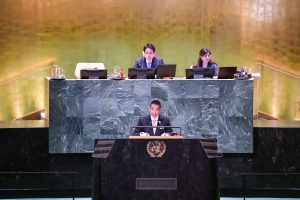The season of high-level multilateral meetings brings a surge in discussions about Thailand’s extroverted diplomatic efforts – set in motion by the Srettha Thavisin government and now pursued by the Paetongtarn Shinawatra administration, both of which were “democratically elected” – to undo the introverted legacy left by almost a decade of military-led rule. Several skeptical comments on my latest article for The Diplomat, somewhat provocatively titled “Thailand’s Foreign Policy Is Inherently Undervalued,” also revolved around the nature of this so-called proactive diplomacy.
The extent of Thailand’s diplomatic proactivity in its current state warrants review, especially since there seems to be no fixed criteria for assessing it. Relative to the military-led predecessor, the uptick in Thailand’s diplomatic outreach is unmistakable. But whether this will have longer-term impacts on the broader regional context remains questionable. Proactivity can, after all, tread a thin line between being substantive and merely a spectacle. The narrative of Thailand breaking out of its shell to become a proactive actor on the global stage might ultimately be more a matter of self-perception than a question of how it is seen externally.
Srettha, who dedicated a record-breaking 30 percent of his first six months in office abroad to boosting Thailand’s international visibility, grounded his diplomatic approach in two key principles. First, a laser-focus on advancing Thailand’s best interests: ramping up investment opportunities and promoting Thai “soft power,” thereby boosting the sluggish economy and putting food on people’s tables. Second, to facilitate this growth-driven agenda, Thailand must stay neutral and sustain friendly relations with all.
Paetongtarn is following the same playbook, though with slight adjustments. Given her (worrisome level of) inexperience, Paetongtarn herself is likely to be steered toward a more restrained role. She skipped this month’s U.N. General Assembly in New York, which Srettha attended upon taking office last year, and let Foreign Minister Maris Sangiampongsa take the stage, where he spoke of inclusivity in common areas of interest and spotlighted Thailand’s role as a bridge-builder and friend to all.
What’s more interesting is the shift in the language. In Paetongtarn’s brief foreign policy segment during her inaugural parliamentary address, the first point she made was that Thailand will uphold its stance of not partaking in international disputes. This departure from the standard phrase of “maintaining neutrality and peace” to the first and foremost direct mention of “disputes” reflects Thailand’s growing recognition of escalating geopolitical tensions and protectionism.
At the same time, such an alteration in language is precisely what exposes the limits of Thai diplomatic proactivity. Just because Thailand isn’t currently involved in disputes at major flashpoints doesn’t mean that it is immune to facing such challenges in the future. The Gulf of Thailand, an extension of the South China Sea, marked by the growing presence of the China Coast Guard and People’s Liberation Army Navy, and where Thailand has unresolved maritime boundaries with Cambodia, is a potential trigger point.
Even if the Gulf of Thailand is spared, Thailand could still be unknowingly dragged into conflicts in a similar manner to what has apparently happened to Taiwan and Hungary (among other nations) in the recent Hezbollah device explosions. With electronics being significant Thai exports, the possibility of external parties tampering with them and with terrible suddenness is a genuine concern.
To be clear, Thailand should strive to remain a friend-to-all without taking sides, and the kingdom doesn’t need to spell out its stance on every critical strategic issue (strategic ambiguity isn’t necessarily a bad thing). The crux of the matter is that there doesn’t seem to be enough thinking – at least from what’s been made public – about worst-case scenarios.
Thailand’s two most important bilateral relationships beyond its immediate neighbors are undoubtedly the Thailand-U.S. alliance and the Thailand-China comprehensive strategic partnership. The prevailing thought has been that Thailand relies on Washington for security while turning to China for economic advancement, much like the rest of Southeast Asia. Yet today’s dynamics are not clear-cut, with Thailand buying more arms from China and the Thai public viewing economic over security ties as the main benefit of Thailand’s relations with the U.S. What I’d like to ask Thai decision-makers is, if given a chance, what Thailand’s distinct interests are today in each of these relationships, and what specific interests should be prioritized and can realistically be better protected if a conflict between the two giants flares up around, say, Taiwan.
Hypothetical situations aside, one strategic issue directly and urgently affecting Thai security is Myanmar. Thailand has seen improvements in its response since the days the military began moving away from the dubious, much-criticized approach to better align with ASEAN’s framework. This includes the establishment of the ASEAN-endorsed humanitarian corridor. The problem, however, is the lack of continuity. Foreign Minister Maris, who replaced Parnpree Bahiddha-nukara following the Srettha government’s April cabinet reshuffle, basically left existing initiatives frozen.
Part of this problem likely relates to conflicts of interest, while another part pertains to how the Thai bureaucracy operates. As hinted by Panitan Wattanayagorn, a political scientist with years of experience working for various Thai administrations, a foreign minister without the concurrent post of deputy prime minister essentially has no authority to effect changes. Maris had and still has no dual post, and Parnpree resigned because he wasn’t assigned the simultaneous deputy prime minister role he originally held.
Serving another term under Paetongtarn, Maris is making efforts to reinstate the proactive Myanmar policy, with Thailand preparing to host the ASEAN Troika Plus meeting. Observers will be keen to see if Thailand has the resolve to offer more than just playing host.
As things stand, it’s hard to confidently assert that Thailand has fully embraced the mantle of a proactive international player.

































